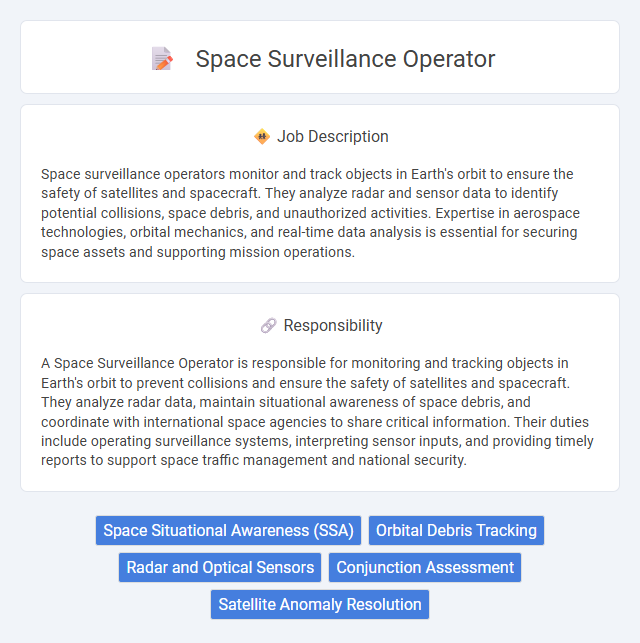
Space surveillance operators monitor and track objects in Earth's orbit to ensure the safety of satellites and spacecraft. They analyze radar and sensor data to identify potential collisions, space debris, and unauthorized activities. Expertise in aerospace technologies, orbital mechanics, and real-time data analysis is essential for securing space assets and supporting mission operations.
Individuals with strong analytical skills and high attention to detail are likely to be well-suited for a space surveillance operator role due to the need for constant monitoring and interpretation of complex data. Those who can handle high-pressure environments and maintain focus over long periods may find the job manageable, while people prone to stress or distraction might struggle. The role might also favor those comfortable with technology and teamwork, as collaboration and technical proficiency are often essential.
Qualification
A Space Surveillance Operator requires expertise in satellite tracking technologies, radar systems, and space situational awareness protocols. Proficiency in data analysis, real-time monitoring, and threat detection related to orbital debris and space objects is essential. Certification in aerospace operations or a background in aerospace engineering, computer science, or military space operations enhances qualification for this role.
Responsibility
A Space Surveillance Operator is responsible for monitoring and tracking objects in Earth's orbit to prevent collisions and ensure the safety of satellites and spacecraft. They analyze radar data, maintain situational awareness of space debris, and coordinate with international space agencies to share critical information. Their duties include operating surveillance systems, interpreting sensor inputs, and providing timely reports to support space traffic management and national security.
Benefit
Space surveillance operators likely benefit from working in a cutting-edge field that supports national security by tracking satellites and space debris. The job probably offers opportunities for skill development in advanced radar and sensor technologies, enhancing career prospects in aerospace and defense sectors. Employees are also expected to receive competitive salaries and access to specialized training programs.
Challenge
Space surveillance operators likely face the challenge of monitoring an increasing number of artificial objects and debris in Earth's orbit. The evolving nature of space technology and potential collisions create complex scenarios requiring precise tracking and quick decision-making. These operators probably need to adapt continuously to new threats and advances in surveillance systems.
Career Advancement
Space surveillance operators play a critical role in tracking and analyzing objects in Earth's orbit to ensure space safety and security. Career advancement opportunities often include specialized training in advanced radar systems, satellite technology, and space situational awareness, leading to positions such as senior operator, systems analyst, or mission planner. Progression in this field also offers potential roles in space command centers, defense agencies, or commercial aerospace companies, where expertise in space traffic management and debris mitigation is highly valued.
Key Terms
Space Situational Awareness (SSA)
A Space Surveillance Operator specializes in Space Situational Awareness (SSA), monitoring and tracking objects in Earth's orbit to prevent collisions and ensure satellite safety. Utilizing advanced radar, optical sensors, and data analysis software, they identify space debris, track satellites, and provide real-time alerts to mitigate risks. This role is critical for maintaining operational security and supporting space traffic management in increasingly congested orbital environments.
Orbital Debris Tracking
Space surveillance operators specializing in orbital debris tracking employ advanced radar and optical sensor systems to detect and monitor space debris orbiting Earth. They analyze trajectory data to predict potential collisions, enabling timely maneuvers for satellites and spacecraft to avoid damage. Expertise in orbital mechanics and real-time data processing is essential to maintaining the safety and sustainability of space operations.
Radar and Optical Sensors
Space surveillance operators specialize in monitoring satellites and debris using advanced radar and optical sensors to track objects in Earth's orbit. High-resolution radar systems detect and measure trajectories of space objects under various atmospheric conditions, while optical sensors provide precise imagery and identification of smaller debris fragments. Expertise in interpreting sensor data and maintaining surveillance networks ensures collision avoidance and space traffic management.
Conjunction Assessment
Space surveillance operators conduct conjunction assessments to predict and prevent potential collisions between satellites and space debris. Utilizing radar and optical tracking data, they analyze trajectories and identify close approach events to ensure satellite safety and operational continuity. This role requires expertise in orbital mechanics, real-time data analysis, and risk mitigation strategies.
Satellite Anomaly Resolution
A Space Surveillance Operator specializes in monitoring and diagnosing satellite anomalies to ensure uninterrupted satellite functionality. Expert analysis of telemetry data and real-time sensor inputs enables timely identification and resolution of malfunctions or performance deviations. Proficiency in anomaly resolution protocols and collaboration with satellite engineering teams is critical for mission success and space asset protection.
 kuljobs.com
kuljobs.com